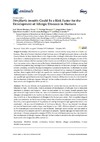Identificador persistente para citar o vincular este elemento:
https://accedacris.ulpgc.es/jspui/handle/10553/74795
| Título: | Dirofilaria immitis could be a risk factor for the development of allergic diseases in humans | Autores/as: | Montoya Alonso, José Alberto Morchon Garcia,Rodrigo Matos Rivero, Jorge Isidoro Falcón Cordón, Yaiza Costa Rodríguez, Noelia Carretón Gómez, Elena |
Clasificación UNESCO: | 310907 Patología | Palabras clave: | Dirofilaria immitis Antibodies Canary Islands Human dirofilariosis Zoonosis, et al. |
Fecha de publicación: | 2020 | Publicación seriada: | Animals | Resumen: | The Canary Islands are hyperendemic for canine heartworm and the risk of zoonotic infection is high. Additionally, there is evidence of development of allergies due to nematode infections in animals and humans. Since the population of the Canary Islands presents high prevalence of allergic comorbidities, and previous studies have shown a possible relationship between allergies and seropositivity to heartworm, the aim was to evaluate whether exposure to heartworm may contribute to the development of allergies in the human population. First, an epidemiological study was conducted on 248 owners of dogs with/without heartworm infection in the Canary Islands. Secondly, a serological analysis of the presence of total IgE and specific IgE against heartworm was conducted in 66 samples of inhabitants of the Canary Islands. The survey showed that allergic owners had heartworm-positive dogs more frequently (p < 0.01). Of the analyzed human samples, 43.9% were seropositive to heartworm and Wolbachia. Total IgE concentrations were increased in 34.5% seropositive samples and 8.1% seronegative samples. Specific IgE against heartworm was only found in human seropositive samples (17.2%). Contact with heartworm may be a risk factor for the development of allergic diseases, although further studies to elucidate the relationship between heartworm and allergies should be carried out. | URI: | https://accedacris.ulpgc.es/handle/10553/74795 | ISSN: | 2076-2615 | DOI: | 10.3390/ani10101847 | Fuente: | Animals [EISSN 2076-2615], v. 10 (10), p. 1847, (October 2020) |
| Colección: | Artículos |
Citas SCOPUSTM
4
actualizado el 08-jun-2025
Citas de WEB OF SCIENCETM
Citations
5
actualizado el 15-feb-2026
Visitas 5
74
actualizado el 10-ene-2026
Descargas
41
actualizado el 10-ene-2026
Google ScholarTM
Verifica
Altmetric
Comparte
Exporta metadatos
Los elementos en ULPGC accedaCRIS están protegidos por derechos de autor con todos los derechos reservados, a menos que se indique lo contrario.
